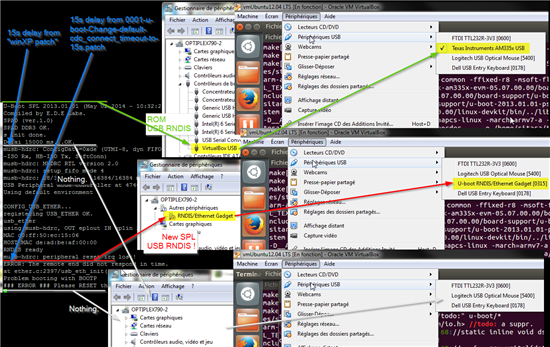Hi.
I'm trying to get a board we made booting over an USB RNDIS ethernet connection.
I started with a u-boot compiled for a sitara am335x EVM demo board.
I understood that the source code should be adapted to our own board (closed to AM335x EVM SK demo board, but without any direct ethernet connection, only a RMII phy adaptor on test points). I modified source files that are involved in setting pinmux, I also forced an identification as an EVM SK board, because we haven't got any EEPROM on our board.
Our board start the ROM code, it loads the SPL u-boot from my host machine (using USB RNDIS driver). The transfer succeeds, The SPL starts running, but fails with the following message on uart0 output :
U-Boot SPL 2013.01.01 (Apr 24 2014 - 21:20:32)
musb-hdrc: ConfigData=0xde (UTMI-8, dyn FIFOs, bulk combine, bulk split, HB-ISO Rx, HB-ISO Tx, SoftConn) musb-hdrc: MHDRC RTL version 2.0
musb-hdrc: setup fifo_mode 4
musb-hdrc: 28/31 max ep, 16384/16384 memory
USB Peripheral mode controller at 47401000 using PIO, IRQ 0
Using default environment
usb_ether
using musb-hdrc, OUT ep1out IN ep1in STATUS ep2in
MAC d0:ff:50:ec:15:06
HOST MAC de:ad:be:af:00:00
RNDIS ready
musb-hdrc: peripheral reset irq lost!
ERROR: The remote end did not respond in time.
at ether.c:2399/usb_eth_init()
Problem booting with BOOTP
### ERROR ### Please RESET the board ###
Could it be possible to get some help on this subject, since I already spent 4 days on it and I don't know where to look now ?
Thanks in advance.
BR
Didier


